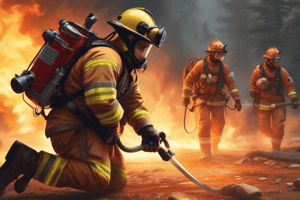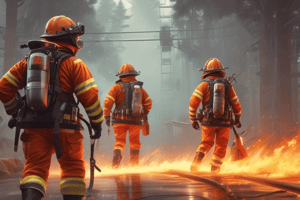Podcast
Questions and Answers
What is the primary focus of self-rescue and incident safety in firefighter training?
What is the primary focus of self-rescue and incident safety in firefighter training?
The primary focus is on personal safety measures to prevent injuries during incidents and maintaining safety throughout the incident response.
Describe the typical structure of trainee preparation in firefighter training programs.
Describe the typical structure of trainee preparation in firefighter training programs.
Trainees usually start with theoretical instruction followed by practical drills, and regular assessments are conducted to evaluate their skills.
How does TFS utilize simulations in their training for firefighters?
How does TFS utilize simulations in their training for firefighters?
TFS uses simulations to recreate real-world fire and emergency scenarios, which helps trainees practice their response in a controlled environment.
What role does documentation play in firefighter training and safety?
What role does documentation play in firefighter training and safety?
Explain the importance of regular assessments in firefighter training.
Explain the importance of regular assessments in firefighter training.
What are Standard Operating Guidelines (SOG) and why are they essential for emergency response?
What are Standard Operating Guidelines (SOG) and why are they essential for emergency response?
Describe the significance of continuous training for firefighters in Toronto Fire Services (TFS).
Describe the significance of continuous training for firefighters in Toronto Fire Services (TFS).
What are some specific areas covered in the TFS training programs?
What are some specific areas covered in the TFS training programs?
How do SOGs influence the training and operations of the Toronto Fire Services?
How do SOGs influence the training and operations of the Toronto Fire Services?
Why is practical exercise and simulation included in firefighter training programs?
Why is practical exercise and simulation included in firefighter training programs?
In what ways are SOGs revised to ensure they remain effective?
In what ways are SOGs revised to ensure they remain effective?
What role does fire prevention education play in the training of TFS personnel?
What role does fire prevention education play in the training of TFS personnel?
Explain the importance of the incident command system (ICS) in firefighting training.
Explain the importance of the incident command system (ICS) in firefighting training.
Flashcards
Self-rescue and incident safety
Self-rescue and incident safety
Involves personal safety measures firefighters take to avoid injuries during incidents.
Theoretical instruction followed by practical drills
Theoretical instruction followed by practical drills
Training method that starts with explanations and then moves to hands-on practice.
Assessments in firefighter training
Assessments in firefighter training
Regular tests to check learning and skill mastery.
Simulations in firefighter training
Simulations in firefighter training
Signup and view all the flashcards
Documentation in firefighter training
Documentation in firefighter training
Signup and view all the flashcards
Standard Operating Guidelines (SOPs)
Standard Operating Guidelines (SOPs)
Signup and view all the flashcards
Toronto Fire Services (TFS) Training
Toronto Fire Services (TFS) Training
Signup and view all the flashcards
Fire Suppression Techniques
Fire Suppression Techniques
Signup and view all the flashcards
Rescue Techniques
Rescue Techniques
Signup and view all the flashcards
Hazardous Materials Handling
Hazardous Materials Handling
Signup and view all the flashcards
Incident Command System (ICS)
Incident Command System (ICS)
Signup and view all the flashcards
Emergency Medical Services (EMS)
Emergency Medical Services (EMS)
Signup and view all the flashcards
Fire Prevention
Fire Prevention
Signup and view all the flashcards
Study Notes
Toronto Fire Training - General
- Toronto Fire Services (TFS) provides comprehensive training programs for firefighters.
- Training emphasizes safety, equipment operation, and emergency response procedures.
- Programs cover various aspects of fire-fighting operations, including fire suppression, rescue operations, and hazardous materials handling.
- Continuous training and refresher courses are crucial for maintaining skill proficiency and knowledge.
- Training often incorporates practical exercises and simulations to hone skills in a controlled environment.
- TFS maintains rigorous standards for training and certification.
- Training materials may include instructional manuals, videos, and on-site demonstrations.
Standard Operating Guidelines (SOG)
- SOPs detail procedures and protocols for responding to different emergency situations.
- They establish clear lines of communication and responsibilities for personnel involved in incidents.
- SOGs include pre-determined actions, steps, and procedures to achieve optimal response.
- Consistency in response is ensured via standardized procedures.
- SOPs often delineate protocols for various scenarios such as structure fires, vehicle incidents, and hazardous materials spills.
- They are updated as needed to reflect best practices and current threats.
- Each incident and response is documented in accordance with the SOG.
- These documents are crucial for training and standardization within the TFS.
- SOGs are revised periodically to reflect changes in the field, new equipment, or new legislation.
Training - Specific Areas
- Fire suppression techniques: Covers methods of extinguishing various types of fires, including structural, vehicle, and wildland fires.
- Rescue techniques: Addresses the safe extrication and evacuation of victims trapped in fire or other hazards. Protocols for different types of victim entrapment are included.
- Hazardous materials handling: Includes identification, containment, and mitigation strategies for hazardous materials incidents.
- Emergency medical services (EMS): Covers the provision of medical aid and care at the scene of an emergency.
- Fire prevention: Includes educational elements on preventing fires from occurring in the first place.
- Incident command system (ICS): Includes the organizational structures, principles, and management procedures for managing complex incidents.
- Self-rescue and incident safety: Emphasizes personal safety measures to prevent firefighter injuries during incidents, as well as proper procedures for maintaining safety throughout various phases of the incident response.
General Training Structure
- Trainees typically begin with theoretical instruction followed by practical drills.
- Regular assessments are conducted to evaluate learning and skill mastery.
- TFS uses simulations to recreate real-world fire and emergency scenarios.
- The goal of TFS' training is to prepare firefighters to respond effectively and safely to various emergencies.
Documentation
- Detailed records of training, certifications, and adherence to procedures are maintained.
- This includes all training activities, performance assessments, and safety records.
- Proper documentation is key for maintaining accountability and performance record-keeping for both personnel and the organization.
Studying That Suits You
Use AI to generate personalized quizzes and flashcards to suit your learning preferences.




